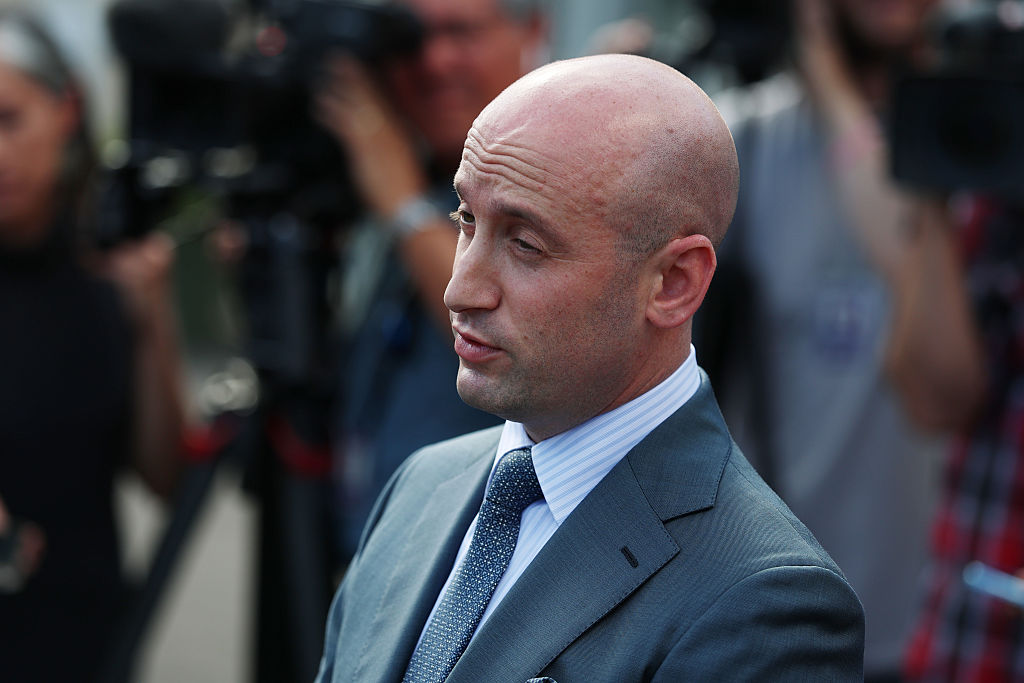A growing chorus of Trump allies is urging the President to defy federal court orders, pushing the country toward a direct confrontation between the Executive Branch and the Judiciary—the very outcome the Constitution was designed to prevent.
[time-brightcove not-tgx=”true”]
After a federal judge in Oregon ruled over the weekend that President Donald Trump had overreached by ordering National Guard troops to Portland, right wing political podcast host Matt Walsh urged his 3.9 million followers that “Trump needs to openly defy these judges” and it is “time for a showdown.” The richest man in the world Elon Musk replied to Walsh’s message, writing: “It is high time that corrupt judges who violate the Constitution be fired!”
At the White House later that day, Trump’s deputy chief of staff Stephen Miller called the judge’s decision to temporarily block the Portland troop deployment “legal insurrection.” Federal District Court Judge Karin Immergut ruled that the protests outside the Immigration and Customs Enforcement offices in Portland did not justify Trump’s use of military action. Miller said that ruling—and other court orders that have blocked some of Trump’s actions over the past 9 months —amount to “an insurrection against the laws and Constitution of the United States.”
District courts, he said, need to “see themselves as being under the laws and Constitution and not being able to take for themselves powers that are reserved solely for the President.”
Read more: Democrats Need Judges to Rein In Trump. There’s No Plan B
The word insurrection carries legal weight. The Insurrection Act of 1807 gives the President extraordinary powers in the event of an armed rebellion. President Donald Trump was asked by a reporter in the Oval Office on Monday if he would invoke the Insurrection Act. He said he would “if people were being killed” and he believed courts and city mayors were holding him back. “Well, I’d do it if it was necessary. So far, it hasn’t been necessary,” Trump said. “ If people were being killed and courts were holding us up or governors or mayors were holding us up, sure, I would do that,” Trump said.
The increasingly vehement rhetoric against judges comes at the same time as Trump has directed his Justice Department to prosecute his political opponents, alarming legal experts.
On Wednesday, former FBI Director James Comey, who investigated Trump for possible collusion with Russia, was arraigned after Trump publicly called on Attorney General Pam Bondi to prosecute Comey and others who have investigated him.
Kristy Parker, special counsel at Protect Democracy and a former federal prosecutor, says the moves together represent a threat to American democracy.
“These are really fundamental assaults on our rule of law, system of government, and the fundamental structure of our government,” she tells TIME. “Our founders created three coequal branches of government precisely so that we would not have the person of the president becoming a tyrannical force.”
“Calling on your court orders and the administration actually ignoring court orders should chill everyone who thinks that we ought to be living in the democracy that our founders created,” she adds.
The role of the courts is to decide if the President is acting within the limits set by the Constitution and the law, says Elizabeth Goitein, senior director of the Brennan Center’s Liberty and National Security Program. “When it comes to the President’s assessments of the realities on the ground, courts do tend to give Presidents deference.” But recent court decisions have concluded that the Trump administration’s reasons for wanting to use the military in Portland were “untethered from the facts on the ground,” Goitein says.
Still, many of the president’s own supporters believe he is still acting within the bounds of his authority.
John Malcom, vice president of the Heritage Foundation, the think tank behind conservative policy program Project 2025, says a president ignoring a judge’s rulings would be “a risky thing to do, to say the least,” but he believes that he would have the authority to do so “under extreme circumstances.”
Malcolm notes former President Andrew Jackson’s refusal to enforce the Supreme Court’s Worcester v. Georgia decision, which established the Cherokee Nation as a distinct political entity with its own rights and sovereignty, and led to the infamous “Trail of Tears”.
“I think President Trump has thus far resisted defying any court order, even though I do think that there are a lot of Democrat appointed judges in blue states who are going out of their way to try to frustrate his agenda,” he says.
In the immigration courts, which operate under the Executive Branch, the Trump Administration has been more aggressive. More than 130 immigration judges have been fired, involuntarily transferred, or accepted early retirement offers since the start of Trump’s second term.
“This President certainly takes advantage of the flexibility and flexible authorities that he has been given,” Malcolm says. “And I am reluctant to criticize it if I think that he’s acting within the scope of his authority.”

